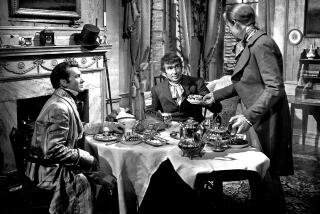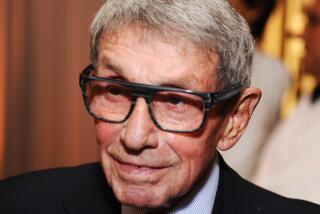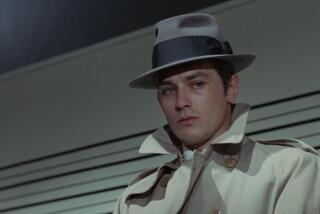Mo Rothman dies at 92; found new audience for Chaplin
Mo Rothman, a veteran studio executive who helped pave the way for Charlie Chaplin to end an acrimonious, two-decade exile from the United States and returned some of the filmmaker’s classic movies to American screens, died Sept. 15 in Los Angeles. He was 92. Rothman had Parkinson’s disease, his family said.
Rothman had met Chaplin in the 1950s when he was a European manager for United Artists. Chaplin, one of the founders of United Artists along with D.W. Griffith, Mary Pickford and Douglas Fairbanks, was one of Hollywood’s most powerful and creative figures until his image was tarnished by affairs with underage women and his leftist politics, which made him a target of McCarthy-era Communist hunters.
In 1952, U.S. Atty. Gen. James P. McGranery announced that if Chaplin, a native of England, left the U.S., where he had lived for 40 years, he would be denied reentry. After attending the London premiere of “Limelight,” the last film he made in his adopted country, Chaplin moved to Switzerland, vowing never to return. He took with him the rights to nearly all his movies.
In 1971 Rothman, by then a top executive at Columbia Pictures, left the studio to head a group of investors who sought access to a number of Chaplin’s treasured films. They paid Chaplin $6 million and 50% of the royalties for distribution rights to some of the legendary actor-director’s most celebrated movies. These included “City Lights,” “Modern Times,” “Limelight,” “The Gold Rush” and “The Great Dictator.”
By then, anti-Communist fervor had waned and Hollywood was eager to honor the aging cinema pioneer. Persuaded by Rothman that a visit to the U.S. would help draw attention to the reissued films, the 83-year-old Chaplin agreed, with some trepidation, to return.
On April 2, 1972, Chaplin, accompanied by his wife, Oona, and Rothman, arrived in New York, where he received a warm, extended ovation at the Film Society of Lincoln Center’s tribute to his films. The following week he was given an honorary Academy Award in Los Angeles.
His triumphant return created the perfect conditions for a Chaplin revival. Rothman was the “brave and clever reviver of Charlie Chaplin worldwide,” the filmmaker’s actress-daughter, Geraldine Chaplin, wrote in a recent statement released by Rothman’s family.
Born in Montreal on Jan. 14, 1919, Moses Rothman served in the Royal Canadian Air Force during World War II before beginning a career in the motion picture business.
For several years after the war, he worked for Universal Pictures as a manager in India, Singapore and Venezuela before moving to Universal’s Paris office in 1952. He was hired at Columbia Pictures in 1960, eventually rising to vice president for worldwide marketing.
Rothman left Columbia in 1971 to work full-time on the distribution of Chaplin’s films.
As the movies began to circulate again, Chaplin rebuilt his American audience. His public image was so thoroughly restored that, several years after his death in 1977, the former subject of government suspicion became, in effect, a goodwill ambassador for the U.S. during the Reagan administration. Rothman played a key role. In the mid-1980s, he lent the United States Information Agency a dozen Chaplin classics to be shown by American embassies around the world as an exemplar of the nation’s art.
Rothman is survived by his wife of 37 years, Lyn, three children, two stepchildren and seven grandchildren.
More to Read
Start your day right
Sign up for Essential California for the L.A. Times biggest news, features and recommendations in your inbox six days a week.
You may occasionally receive promotional content from the Los Angeles Times.





















































